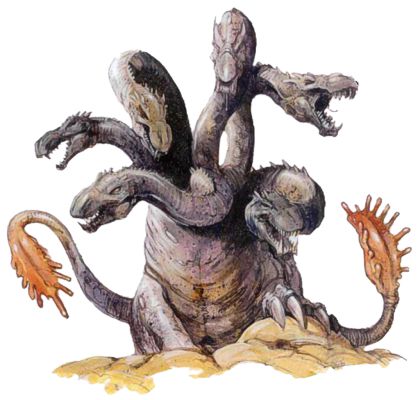

Monstrous Compendium Annual, Volume Two

| Climate/Terrain: | Swamp or subterranean |
|---|---|
| Frequency: | Very rare |
| Organization: | Solitary |
| Activity Cycle: | Any |
| Diet: | Omnivore |
| Intelligence: | Low (5-7) |
| Treasure: | Nil(B) |
| Alignment: | Neutral |
| No. Appearing: | 1 |
| Armor Class: | 0 |
| Movement: | 6 |
| Hit Dice: | 15 |
| THAC0: | 5 |
| No. of Attacks: | 2 tentacles, 6 heads |
| Damage/Attack: | 2d6/2d6/1d8+4 (×6) |
| Special Attacks: | Grab, constriction |
| Special Defenses: | Nil |
| Magic Resistance: | Nil |
| Size: | H (20’) |
| Morale: | Champion (16) |
| XP Value: | 10,000 |
The gulguthhydrae combine the worst attributes of the gulguthras (otyughs and neo-otyughs) and hydrae. Six misshapen hydra heads perch in a circle atop the hulking body of this hybrid, which also possesses the gulguthra's two ridged tentacles. The beast's skin is hard, almost rocklike, and its dingy gray to dusky brown coloration aids it in hiding within its chosen domains – dark swamps or caverns and dungeons. Three squat legs provide locomotion while the two tentacles constantly check the vicinity for edible materials. Gulguthhydrae smell noticeably of rot and decay.
These creatures are so rare that it is unknown if they have any language of their own or if they are able to communicate with other creatures at all.
Combat: Gulguthhydrae are always on the hunt, running their ridged tentacles over the ground and walls or trees, searching for food. When such is found, the tentacles lift the foodstuffs to the mouths of the hydrae. If the “food” resists, the tentacles strike, each inflicting 2d6 points of damage. If the gulguthhydra’s attack roll is at least 4 greater than needed to hit, the prey is grabbed. A grabbed prey can attempt a bend bardlift gates roll to escape every round after the first; the prey is constricted for 1d6+1 points of damage per round, and is lifted toward one of the hydra heads for consumption. A hydra head bites prey held by a tentacle with a +4 attack bonus and inflicts 1d8+4 points of damage (this attack occurs the first round after the victim is grabbed). Up to two heads can bite a target held in a tentacle, and the hydra heads also can attack on their own. Thus, a gulguthhydra can attack up to eight creatures in a round (one for each tentacle, and one per hydra head).
Habitat/Society: Little is known of how these creatures interact with each other. Gulguthhydrae consume any animal or vegetable matter, be it living or dead, fresh or rotted. Driven by its hunger, a gulguthhydra will not pursue active prey if sufficient amounts (50 to 100 lbs.) of other, passive, foodstuffs are available.
Ecology: Gulguthhydrae are perhaps the ultimate scavengers. Solitary creatures, the gulguthhydra incessantly roams its swamp or underground domain for food to drive its massive bulk. A ferocious opponent, a gulguthhydra seldom needs to retreat. Its slow movement rate does not contribute to speedy withdrawals in any case.
Their method of reproduction, if any, is unknown.
